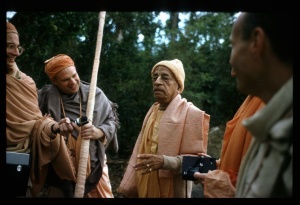SB 3.5.11

A.C. Bhaktivedanta Swami Prabhupada
TEXT 11
kas tṛpnuyāt tīrtha-pado 'bhidhānāt
satreṣu vaḥ sūribhir īḍyamānāt
yaḥ karṇa-nāḍīṁ puruṣasya yāto
bhava-pradāṁ geha-ratiṁ chinatti
SYNONYMS
kaḥ—who is that man; tṛpnuyāt—that can be satisfied; tīrtha-padaḥ—whose lotus feet are all the places of pilgrimage; abhidhānāt—from the talks of; satreṣu—in human society; vaḥ—one who is; sūribhiḥ—by great devotees; īḍyamānāt—one who is so worshiped; yaḥ—who; karṇa-nāḍīm—in the holes of the ears; puruṣasya—of a man; yātaḥ—entering; bhava-pradām—that which awards births and deaths; geha-ratim—family affection; chinatti—is cut off.
TRANSLATION
Who in human society can be satisfied without hearing sufficient talk of the Lord, whose lotus feet are the sum total of all places of pilgrimage and who is worshiped by great sages and devotees? Such topics can cut off one's bondage to family affection simply by entering the holes of one's ears.
PURPORT
Kṛṣṇa-kathā is so powerful that simply by entering into a person's ear it can at once give deliverance from the bondage of family affection. Family affection is an illusory manifestation of the external energy, and it is the only impetus for all mundane activities. As long as there is mundane activity and the mind is absorbed in such engagement, one has to undergo the repetition of birth and death in the current material nescience. People are most influenced by the mode of ignorance, and some are influenced by the passionate mode of material nature, and under the spell of these two modes a living being is actuated by the material conception of life. The mundane qualities do not allow a living entity to understand his real position. The qualities of both ignorance and passion strongly bind one to the illusory bodily conception of the self. The best among the fools who are thus deluded are those who engage in altruistic activities under the spell of the material mode of passion. Bhagavad-gītā, which is direct kṛṣṇa-kathā, gives humanity the elementary lesson that the body is perishable and that the consciousness which is spread throughout the body is imperishable. The conscious being, the imperishable self, is eternally existent and cannot be killed under any circumstances, even after the dissolution of the body. Anyone who misunderstands this perishable body to be the self and who works for it in the name of sociology, politics, philanthropy, altruism, nationalism or internationalism, under the false plea of the bodily conception of life, is certainly a fool and does not know the implications of reality and unreality. Some of them are above the modes of ignorance and passion and are situated in the mode of goodness, but mundane goodness is always contaminated by tinges of ignorance and passion. Mundane goodness can enlighten one that the body and the self are different, and one in goodness is concerned with the self and not the body. But due to being contaminated, those in mundane goodness cannot understand the real nature of the self as a person. Their impersonal conception of the self as distinct from the body keeps them in the mode of goodness within material nature, and unless they are attracted by kṛṣṇa-kathā, they will never be liberated from the bondage of material existence. Kṛṣṇa-kathā is the only remedy for all people of the world because it can situate one in pure consciousness of the self and liberate one from material bondage. To preach kṛṣṇa-kathā all over the world, as recommended by Lord Caitanya, is the greatest missionary activity, and all sensible men and women of the world may join in this great movement started by Lord Caitanya.